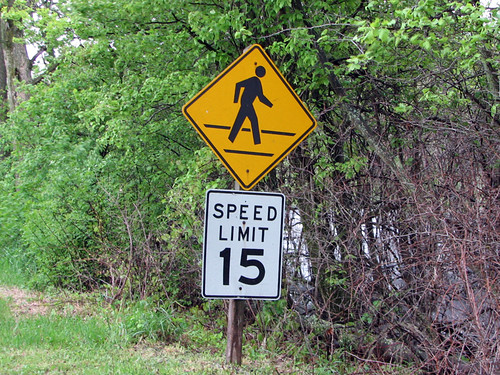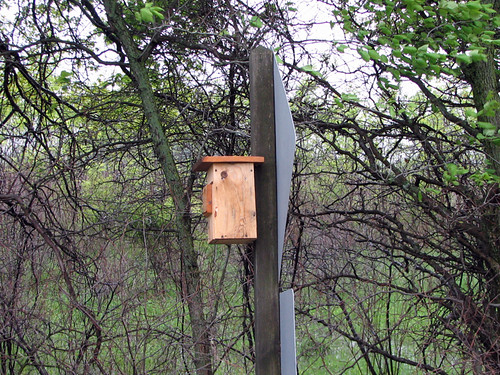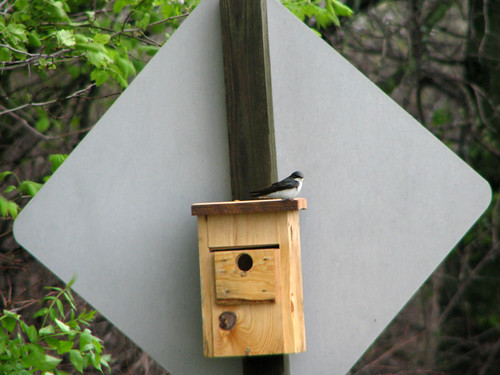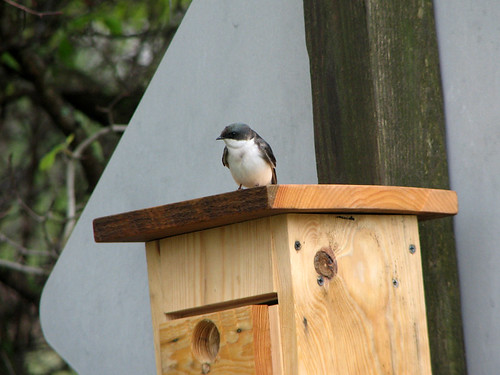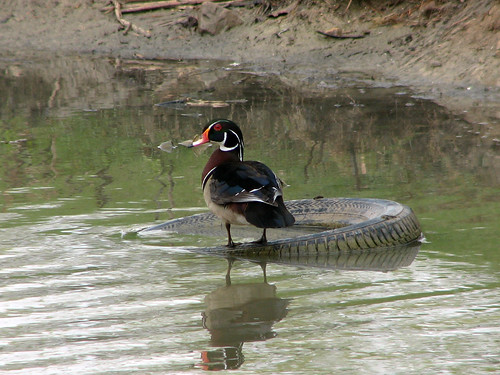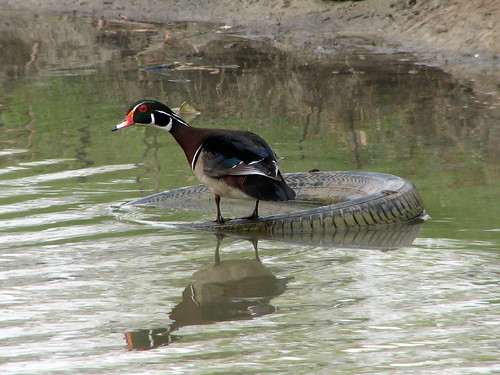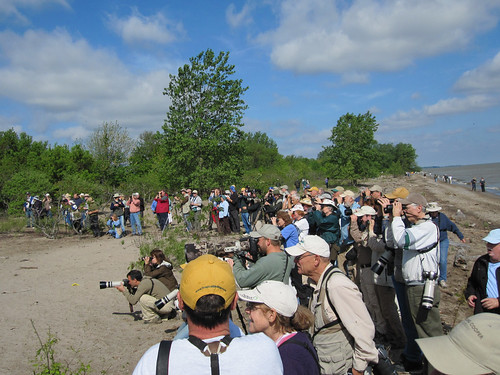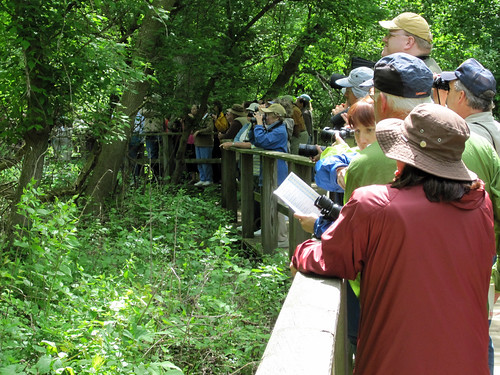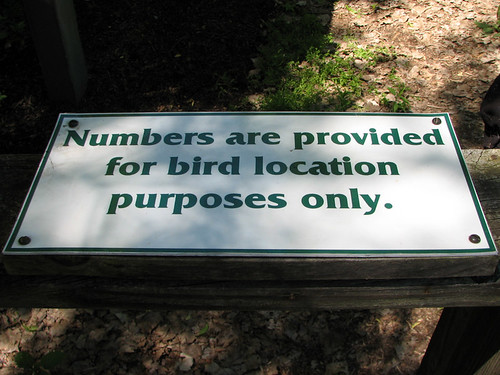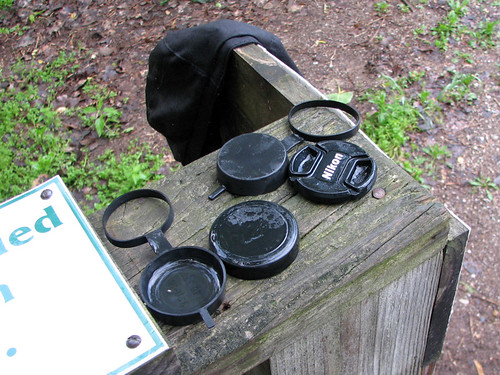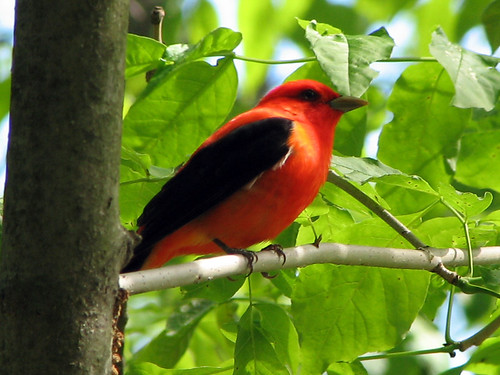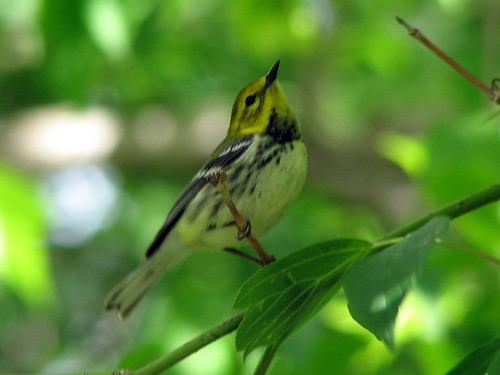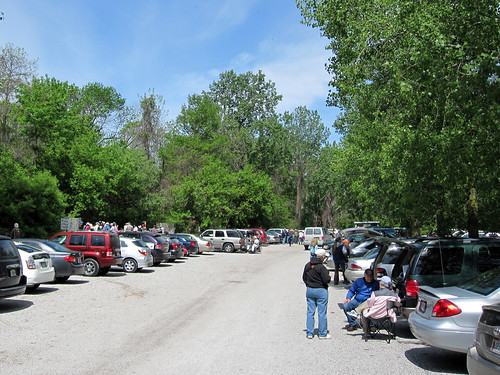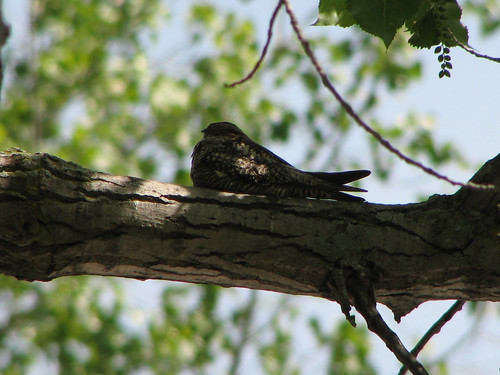Category Archives: North America
Random Ottawa NWR
Here are some pictures from our time at Ottawa NWR during The Biggest Week in American Birding. Click on any picture to embiggen.
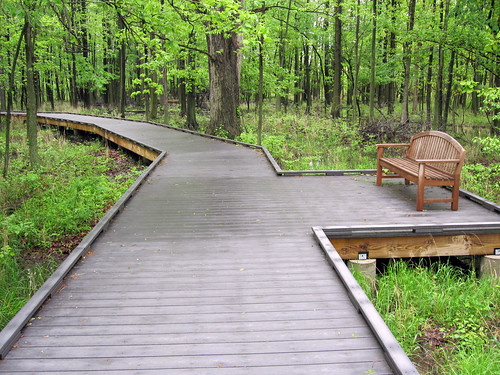
A boardwalk path close to the visitor center.
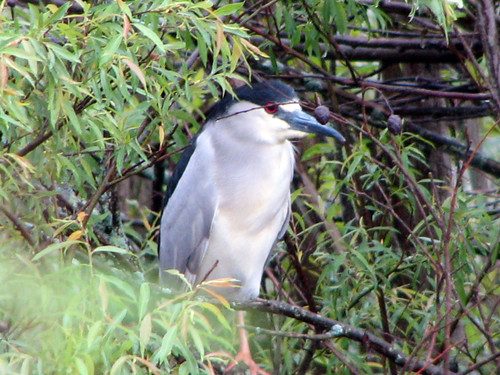
We saw three Black-crowned Night-Herons during a walk at Ottawa.

Organized walks started at the visitor center each day during the festival.
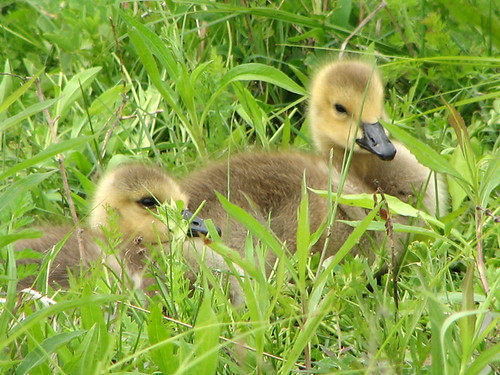
There were goslings all over the place.
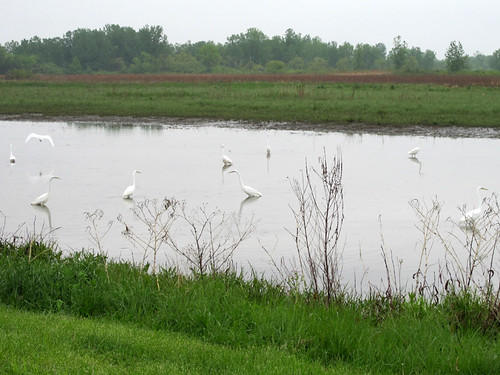
And there were tons of Great Egrets working the water on the way into the reserve.

Some swampy paths were very wet.
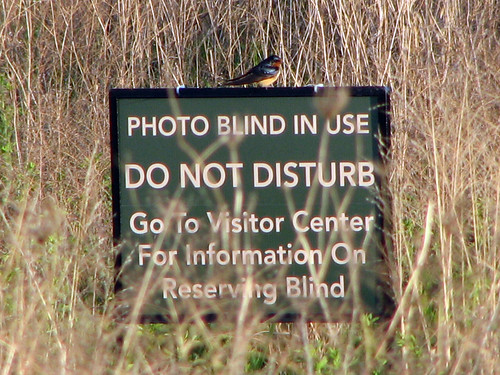
There was a photo blind close to the visitor center.
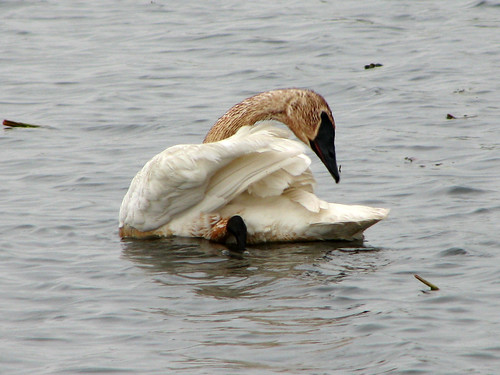
The Trumpeter Swans we saw had discolored necks from feeding.
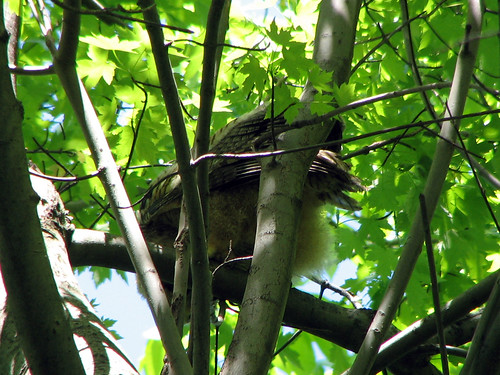
We were very excited to see a “brancher” Great Horned Owl baby high in a tree.
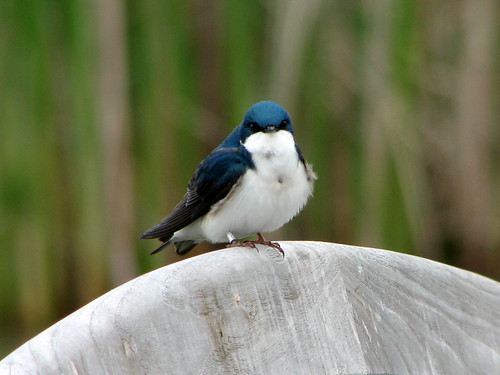
This Tree Swallow and his mate were working on a nest box by the visitor center boardwalk.
Unlikely Wood Duck
The other day Arthur and I were on our way home and we noticed an unlikely bird hanging out in a tiny pond adjacent to a small strip mall. Usually this little pond, dotted with debris, is host to Canada Geese and a small flock of Mallards. Occasionally, Red-winged Blackbirds konk-la-ree from a small patch of reeds. So we were very surprised to see a beautiful male Wood Duck having a preen on a tire in the water.
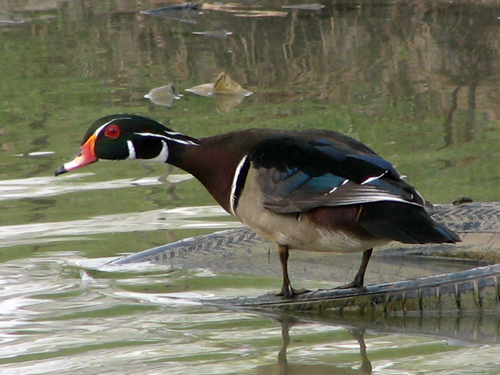
More magic at Magee
Friday morning found us back on the boardwalk at Magee Marsh. The Biggest Week in American Birding was starting to wind down, but the birds were still spectacular. Late Thursday afternoon we noticed a sudden temperature increase, and the murmurs among festival participants was that Friday would be the day. Indeed, warm southerly winds overnight brought in tons of warblers and other migrants to the preserve, and birders were loving every minute. We were about halfway through the boardwalk path when a Chicago birding acquaintance of ours, Eric Gyllenhaal, quickly passed us. He was talking on the phone, and it was obvious he had some news. He was kind enough to interrupt his call momentarily to tell us: “Check your tweets!” Good advice. [Thank you, Eric!!]
At this time we were completely unaware of Magee Marsh outside of the boardwalk, but we followed Eric’s direction and headed east off the boardwalk. Another tweet came in.
By the time we crossed the road towards the beach, we were among several dozen birders heading towards a thicket of trees separating the eastern parking lot from the beach.
Emerging onto the beach, we found ourselves among hoards of people heading towards a growing group of birders. Since this was our fourth try to see this bird (in Ohio, even!), I tried to keep my expectations low. I asked a birder heading back to the parking lot if she had seen it. With her enthusiastic “YES!” I allowed my hopes to rise.
When we approached the birders staking out the rarity, a very kind woman beckoned us over and told us where to look. We could see the Kirtland’s Warbler with our naked eyes. In our binoculars he was larger than life.
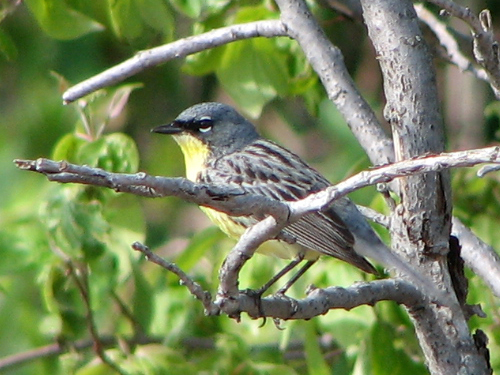
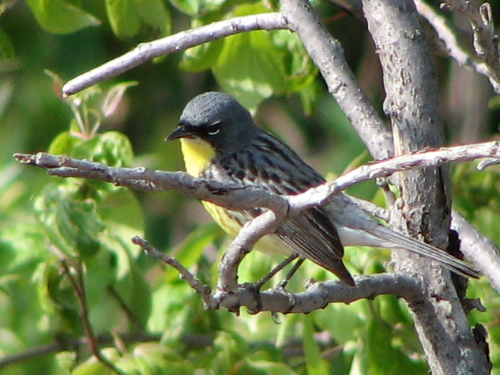

What a gorgeous bird – such a great thrill to see. He was singing, and foraging out in the open.
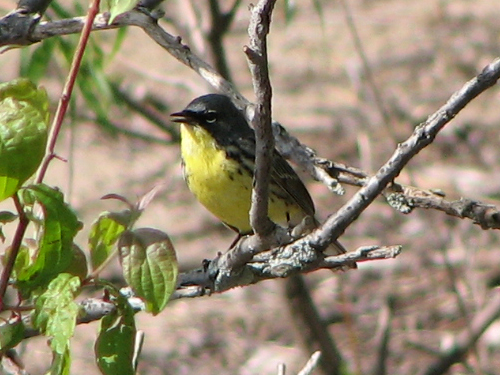
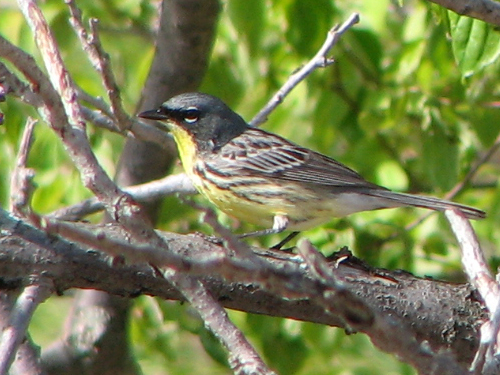
The crowd of spectators grew and grew, and we in turn helped new arrivals get their binoculars on what was surely a life bird for most visitors.
It was really uplifting to be among so many happy birders. People were laughing, doing the lifer dance, high-fiving, and most of all thanking Kenn Kaufman for the amazing sighting.
The bird stayed on the beach nearly all day, and wasn’t refound the next day. Friday was definitely the day!
Seven acres of magical birding
Last week, during the Biggest Week in American Birding, we spent a great deal of time on the boardwalk at Magee Marsh. We missed birding here during last fall’s Midwest Birding Symposium, so it was our first visit.
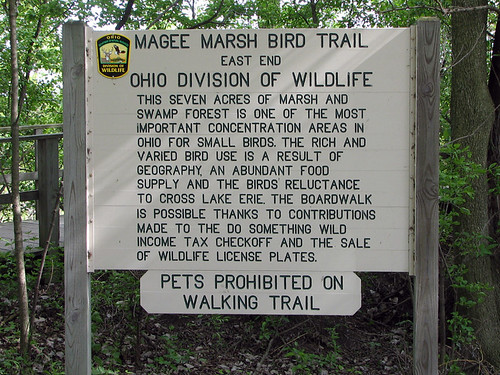
East entrance to the boardwalk.
The boardwalk is the stuff of birding legend, and the stories are all true. Birds perched in front of your nose, great looks at 20+ species of warblers in under an hour, and hundreds and hundreds of birders.
We arrived at the Marsh late Wednesday afternoon, after a long day of driving. The first thing we saw on the boardwalk was a small group of birders staring into the foliage. One of them said matter-of-factly, “There’s a Black-throated Blue right there.” Expecting to peer deep into the vegetation, it took me a moment to find the bird. I didn’t expect it to be within 7 feet of my nose.
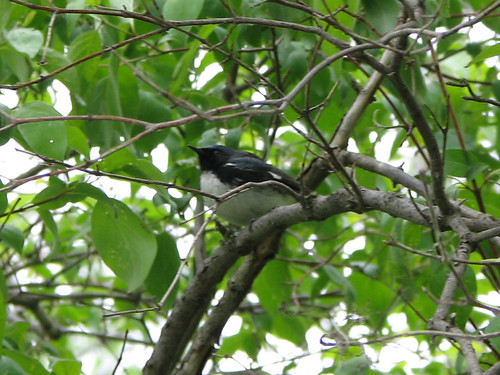
Black-throated Blue Warbler on the boardwalk.
Later, we entered the boardwalk on the west end, where the railing marker numbers start.
There must have been millions of dollars worth of binoculars and camera equipment on the boardwalk during any daylight hour. One morning, we saw the previous day’s losses waiting to be reclaimed.
Most of these photos were taken with my trusty Canon S2IS, a 5MP “superzoom” point-and-shoot camera.
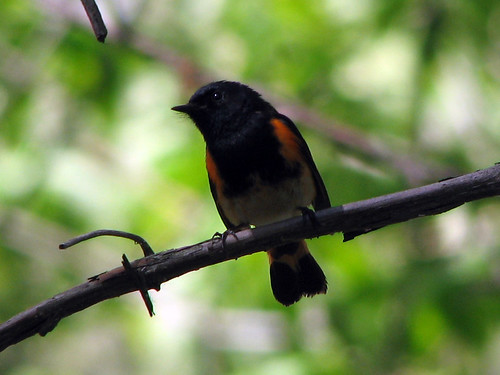
American Redstarts were everywhere, too.
The boardwalk passes by swampy water in several places, where waterbirds skulk for prey.
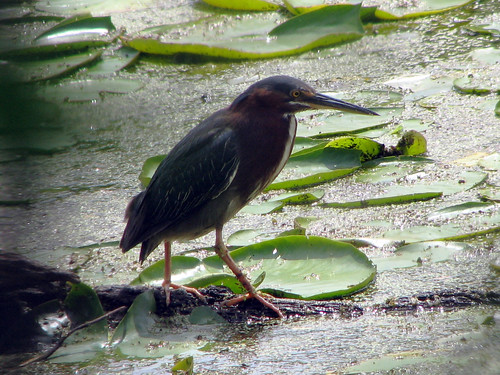
Green Heron seen through thick foliage.
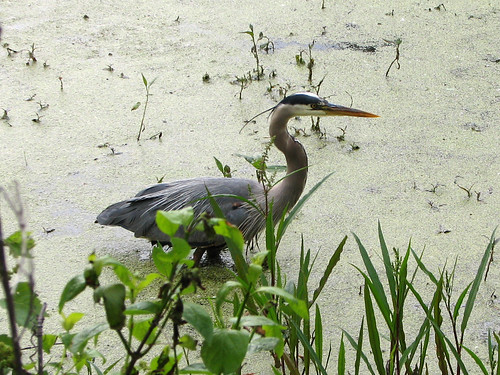
Great Blue Heron out in the open.
While many of the warblers are passing through Magee during their migration north, some birds like Prothonotary Warblers and Yellow Warblers breed at the Marsh. Birders were delighted to watch them bringing material to their growing nests. All at eye level, mind you. No warbler neck required.
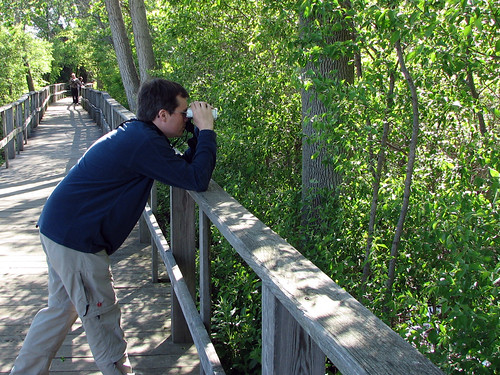
Crouching Birder, Hidden Warbler
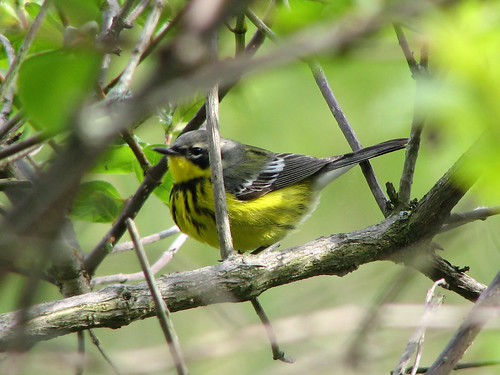
Magnolia Warblers were all over the place.
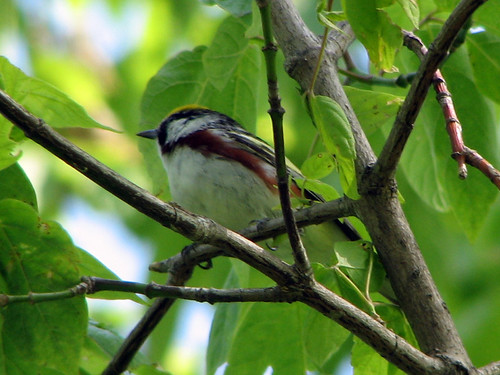
Chestnut-sided Warblers were abundant as well.
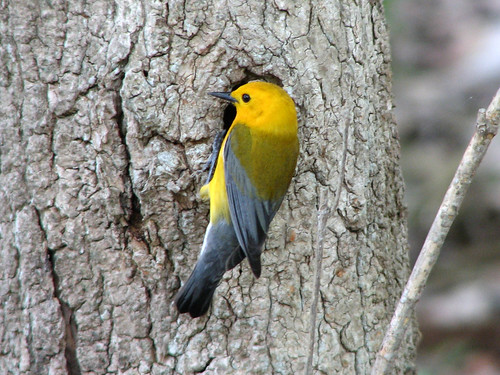
Prothonotary Warblers were busy nest-building.
Prothonotary Warbler feeding for the birdarazzi.
At one point we noticed a pair of Yellow Warblers madly chipping. Arthur spotted a snake in the tree between the birds; we guessed the predator was “disrupting” their nesting activity.
Although the birding on the boardwalk was phenomenal, the search for birds usually began in the parking lot. Here’s a typical scene – full parking lot, birder tailgate party, birdwatchers clumped along the entrance of the boardwalk in the background.
One morning a roosting Common Nighthawk caused some excitement.
Of course, Magee Marsh is not ALL about the boardwalk. Especially on Friday, May 14th, when a very special bird was spotted on the beach. More on that in the next post!
BWIAB Banding @ BSBO
We returned home yesterday from spending five days in northwest Ohio, birding at Magee Marsh and Ottawa NWR, and enjoying programs during the Biggest Week in American Birding. We had heard from many birding friends that Magee Marsh was amazing, but we still managed to underestimate the birding there… it was truly PHENOMENAL. We can’t wait to go back! This is the first of several posts on our time there… starting with some bird banding.
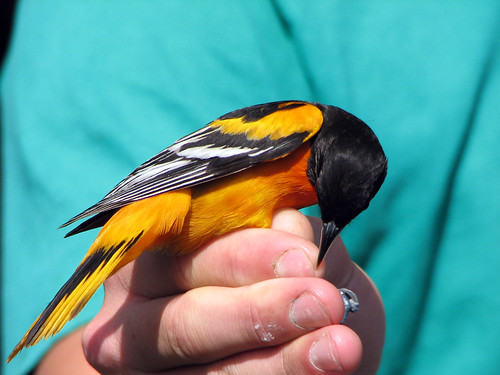
Baltimore Oriole
On Saturday morning we spent some time at the Black Swamp Bird Observatory banding station (which we also visited last fall) and got to see some beautiful birds in the hand.
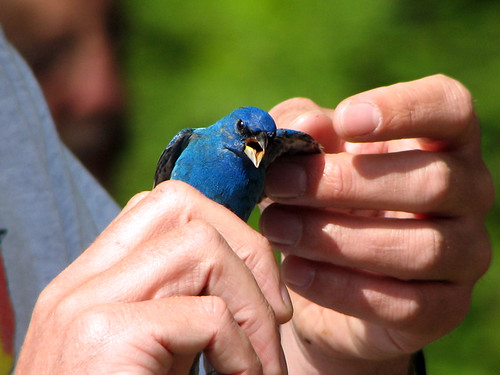
Indigo Bunting
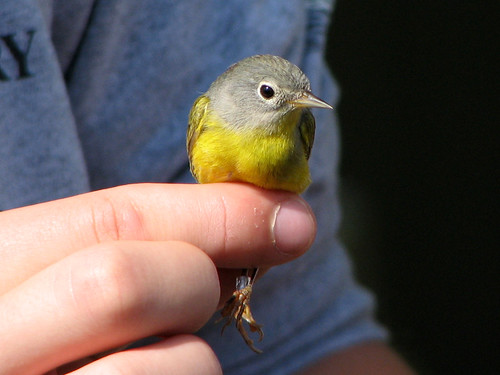
Nashville Warbler
The audience was large and several banders and volunteers showed the birds while explaining the process and what we learn from bird banding.
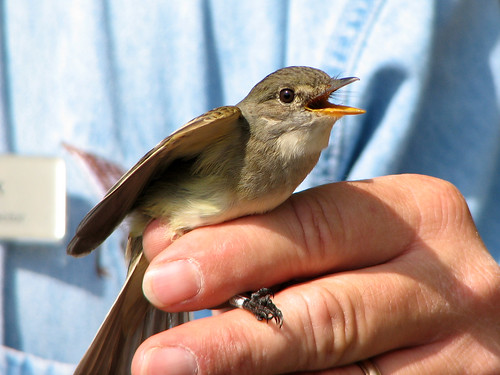
Traill’s Flycatcher
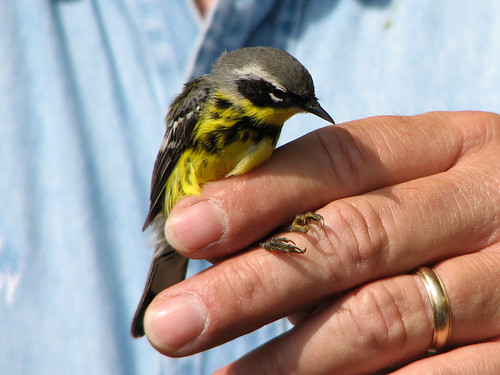
Magnolia Warbler
BSBO director Kim Kaufman explained that birds have a preen gland which secretes oil used in preening. And then she showed it to us, using a Gray Catbird she had in the hand, which was very cool.
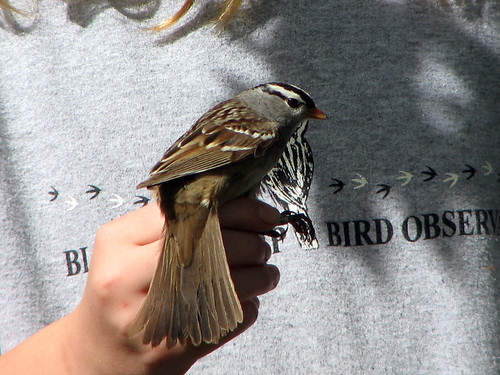
White-crowned Sparrow
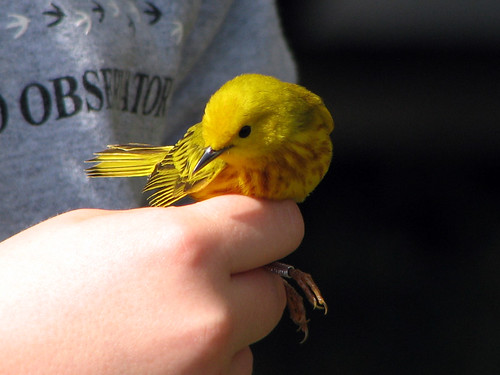
Yellow Warbler
Back Hackmatack
Hackmatack National Wildlife Refuge is a proposed new NWR spanning across parts of Walworth County in Wisconsin and McHenry County in Illinois (our neighboring county). The proposed refuge would link existing public lands and grow with future private and public land purchases and partnerships (an “urban” refuge). It would be very exciting to have a NWR so close to our home!

A detailed map of the area of interest can be found here.
It was announced April 8th that the USFWS will be going forward with a feasibility study of the area, which could take up to two years. This is a great first step to getting the NWR established. You can find out more about the proposed refuge from the Friends of Hackmatack website and keep up with the latest news by following them on Facebook.
You can back Hackmatack by signing the petition of support here.
43 species at Volo Bog
Yesterday we joined McHenry County Audubon’s walk at Volo Bog. We joined them last year at the bog around this time. We didn’t keep track of all species seen the first time, but I have a feeling our count of 43 yesterday beats last year’s tally. We had six FOY birds: American Wigeon, Barn Swallow, Yellow-rumped Warbler, Blue-gray Gnatcatcher, Great Egret and Brown Thrasher. Our full list follows.
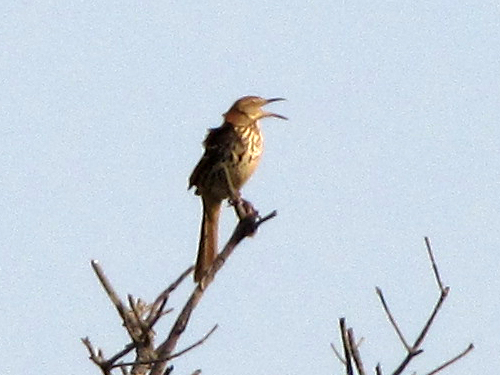
Our first FOY of the day was a singing Brown Thrasher
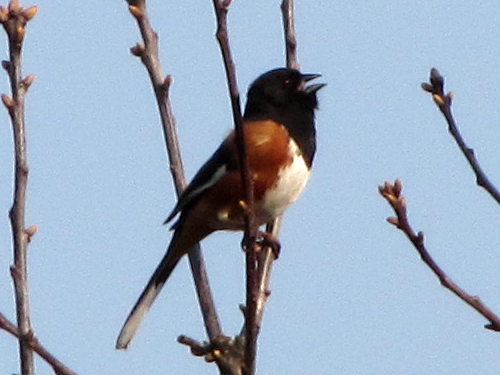
This Eastern Towhee gave us great looks from high atop a tree
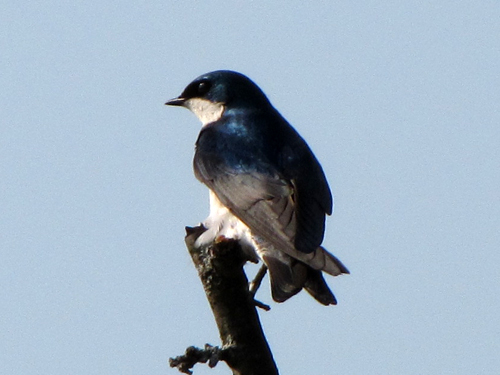
As last time, Tree Swallows were numerous
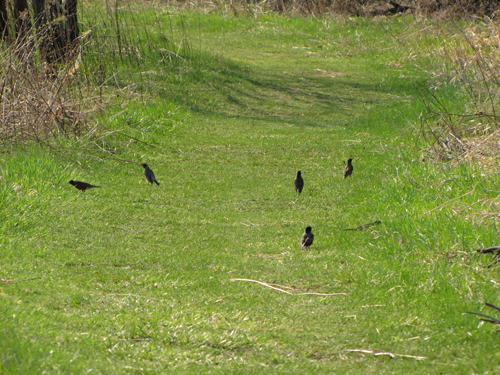
There were lots of American Robins, too, like this group that proceeded us on the path
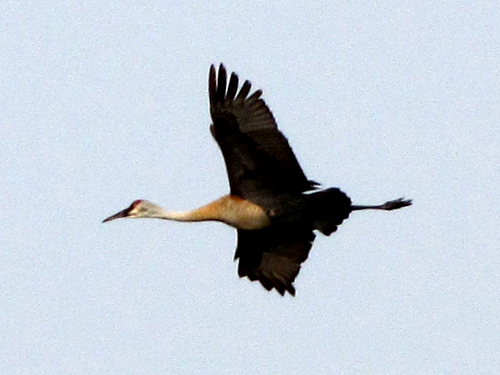
We came across Sandhill Cranes several times during the morning
It was a great walk on a beautiful day. The jury’s still out on my new camera, though.
——————————
Location: Volo Bog State Natural Area (Lake Co.)
Observation date: 4/10/10
Number of species: 43
Canada Goose – Branta canadensis 5
Mute Swan – Cygnus olor 2
Wood Duck – Aix sponsa 2
American Wigeon – Anas americana 1
Mallard – Anas platyrhynchos 12
Blue-winged Teal – Anas discors 7
Northern Shoveler – Anas clypeata 1
Ring-necked Duck – Aythya collaris 2
Hooded Merganser – Lophodytes cucullatus 4
Great Blue Heron – Ardea herodias 2
Great Egret – Ardea alba 1
Red-tailed Hawk – Buteo jamaicensis 1
American Coot – Fulica americana 20
Sandhill Crane – Grus canadensis 6
Killdeer – Charadrius vociferus 1
Ring-billed Gull – Larus delawarensis X
Mourning Dove – Zenaida macroura 5
Red-bellied Woodpecker – Melanerpes carolinus 9
Downy Woodpecker – Picoides pubescens 3
Hairy Woodpecker – Picoides villosus 1
Northern Flicker – Colaptes auratus 1
Eastern Phoebe – Sayornis phoebe 1
Blue Jay – Cyanocitta cristata 2
American Crow – Corvus brachyrhynchos 3
Tree Swallow – Tachycineta bicolor X
Barn Swallow – Hirundo rustica 1
Black-capped Chickadee – Poecile atricapillus 6
Blue-gray Gnatcatcher – Polioptila caerulea 1
Hermit Thrush – Catharus guttatus 1
American Robin – Turdus migratorius X
Brown Thrasher – Toxostoma rufum 1
Yellow-rumped Warbler – Dendroica coronata 12
Eastern Towhee – Pipilo erythrophthalmus 1
American Tree Sparrow – Spizella arborea 5
Song Sparrow – Melospiza melodia 4
Dark-eyed Junco – Junco hyemalis 1
Northern Cardinal – Cardinalis cardinalis 6
Red-winged Blackbird – Agelaius phoeniceus X
Eastern Meadowlark – Sturnella magna 1
Common Grackle – Quiscalus quiscula 2
Brown-headed Cowbird – Molothrus ater 2
American Goldfinch – Carduelis tristis 2
House Sparrow – Passer domesticus 3
This report was generated automatically by eBird v2(http://ebird.org)
That new hedge-magic
It took us a while, but last week we finally got to check out what’s what at Montrose Point Bird Sanctuary in Chicago. We’ve been living in the suburbs for a year and a half and just managed to visit the Magic Hedge for the first time the other day. Goofballs.

The Magic Hedge started as a row of honeysuckle shrubs planted along a fence on the west side of a U.S. Army barracks built here in the 1950’s. The hedge covered the first-floor windows of the two-story building. The Army left around 1970, but the honeysuckles remained.
Lakefront bird watchers noticed that the ragged row of bushes attracted masses of warblers and other birds during migration, diving in and out of the hedge “like magic,” a name that stuck and survives to this day.
Over the years, the hedge was enlarged with many species of shrubs, including serviceberry, chokeberry, sumac and viburnum. These provide seeds and fruit and attract insects for the migrant birds to eat, as well as offer more shelter.


We saw some great birds, including our FOY Northern Flicker, Eastern Phoebe, Eastern Towhee, Golden-crowned Kinglet and Hermit Thrush. Unfortunately none of them would pose for a photo. Others were more obliging.




We stopped by again yesterday, a week after our first visit. It was about 40°F cooler than the first time. A bit less birdy too, but still a great place.
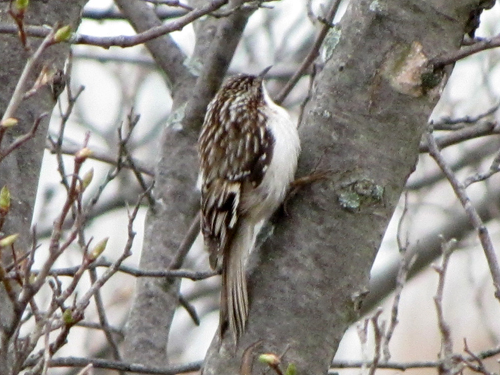


Think we’ll be back.
Kane County Pelicans
Last year around this time, there were lots of reports of American White Pelicans throughout Lake and McHenry counties. We even saw a few. This year, local reports are more sparse.
However, a flock of the birds regularly visit Nelson Lake in Kane County during their spring migration. They are a local attraction of sorts and even caught the attention of Chicago’s PBS channel, which ran this piece on Chicago Tonight April 1st. Check out the cute size comparison where they show the armspan of a Chicago Tonight intern vs. the wingspan of a pelican.

